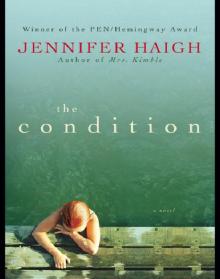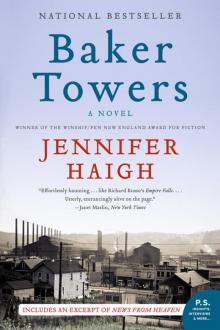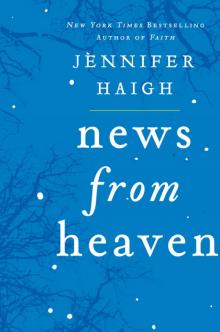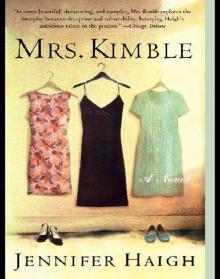- Home
- Jennifer Haigh
Mrs. Kimble Page 2
Mrs. Kimble Read online
Page 2
She found the box in the cupboard and poured the cereal into Jody’s plastic bowl, decorated with pictures of a cartoon cat. She opened the refrigerator and a sour smell floated into the kitchen. The milk had spoiled.
“Oops,” she said, smiling brightly. She ought to pour it down the drain, but the very thought of sour milk turned her stomach; she left the carton where it was. She eyed the wine bottle corked with a paper napkin. Beside it an unopened bottle, the one she hadn’t got to last night. She closed the door.
“Looks like it’s toast for us,” she said. She put two slices of bread in the toaster. She hadn’t finished the bottle, so why did she feel so wretched? On Sunday night she’d had two full bottles, and not so much as a headache when she woke the next morning.
The toast popped, the sound a jolt to her heart. Perhaps she hadn’t overindulged, just consumed unwisely. She’d already learned that red wine hit her hardest, that a small meal—toast or crackers—cushioned the stomach and allowed her to drink more. Beyond that, the workings of alcohol were still a mystery. It seemed to hit her harder at certain times in her monthly cycle; why, she couldn’t imagine. She wondered if this were true for other women. She had no one to ask. Her mother was dead, and anyway had never touched anything stronger than lemonade. Her father’s new wife probably did drink, but Birdie couldn’t imagine talking to Helen about this or anything else.
“Butter?” Jody asked.
“Sorry, button.” Birdie spread the bread with grape jelly and thought of the wine.
She would have been married eight years that Tuesday.
THEIR HOUSE sat back to back with the Raskins’ house; a tall hedge marked the border between the two yards. Charlie stepped through a bare spot in the hedge and cut through the Raskins’ backyard; then he crossed the street to the Hogans’. Mr. Hogan had already left for work. A single light burned in the kitchen window. Out back the Hogans’ dog, Queenie, snored in her pen. Next door the Fleurys’ German shepherd barked wildly—he barked at anything that moved—but Queenie didn’t even stir. She was an old, fat dog, collie and something else. A heavy chain hung from her collar. Charlie wondered why the Hogans bothered. He couldn’t imagine Queenie going anywhere.
He tiptoed toward the pen, where Queenie’s bowl was filled with kibble. The nuggets were still crunchy. Later in the day they would be soft from sitting out in the heat. He filled his pockets with the kibble. He felt bad stealing from the Hogans, but Queenie was fat and lazy. Anyone could see she had too much food already.
From the Hogans’ he went through the Arnetts’ yard and into the woods. The path ran along a shallow stream. Earlier that spring a gang of older boys had built a dam there. He’d been watching the dam for weeks to see if more mud and sticks and rocks were being added. One of the gang, a mean, freckled boy named Jeffrey, had moved away; Charlie had seen the truck drive up to Jeffrey’s house at the bottom of the hill. Since then the boys had neglected the dam. Charlie hoped that if he watched and waited long enough, they would forget the dam completely and it would be his.
He knew about moving. When he was little they’d moved to Richmond from Missouri. He remembered the kitchen full of boxes, his mother wrapping dishes in layers of newspaper. His father had driven the truck. Charlie had sat next to him on a box of books.
There had been no truck when his father went away, no boxes of dishes and newspaper that Charlie saw. He wasn’t there when his father left. He was riding the bus to Pappy’s house with Mama and Jody. When they came back his father was gone. Charlie was six then, had since turned seven. His father hadn’t come back for his birthday. He hadn’t come back at all.
He followed the creek upstream, to where six big rocks lay end to end, making a bridge across the stream. If he was careful he could cross without getting his sneakers wet. He’d always wondered if somebody had made the bridge, carried the heavy rocks to the middle of the stream, or if they’d simply been there forever.
On the other side he ran downstream to where the ground got swampy under his feet. He crossed the swamp to the empty house—old, falling down, its windows covered with boards. Under the front porch lived a mother dog and her four puppies. He’d found the puppies when they were just born, silky, mouselike things with pinkish eyes and small, slick heads, snuggled in close to their mother’s belly. He visited them every day.
He ran around to the front of the house. “Here, boys,” he called softly. The black puppy, the friendliest one and Charlie’s favorite, came first.
He reached into his pocket for a piece of kibble. The puppy came to him and mouthed it, its moist tongue sliding over his palm.
THE THING to do was make a list. In the past Birdie would write down everything: milk, hamburger meat, potatoes. Her husband would drive her to the A&P and walk down the aisles with her and they would talk about the prices of things; he’d lived on a farm as a boy and knew what was in season. Afterward he’d carry the bags into the house and place cans and boxes on the shelves; she’d separate the Green Stamps the cashier had given her and paste them into books. She had saved Green Stamps for years, redeemed them for a carpet sweeper, an egg timer she kept by the stove.
She’d kept busy then. She’d cooked his breakfast. Eggs, she wrote carefully. Bacon. She’d read to the children and made their lunches. Cheese slices. Tomato soup. While the baby slept she would dust or sweep or wash clothes. Oxydol. Clorox bleach. Every few days she’d wash two dozen diapers; the new disposables were too expensive, her husband said. After the laundry she’d start dinner. It seemed impossible, now, that she’d ever done so many things in a day.
Birdie looked at her list, written in wavy letters on the back of an envelope. The ink had begun to smear onto her sweaty hands. The complexity of the plan overwhelmed her: the driving across town, the finding of things in the bright aisles, the carrying of heavy bags from carport to kitchen. She sat for a moment with her head in her hands, her eyes leaking tears.
Jody appeared in the doorway. “Whata matter, Mummy?”
Birdie rubbed her eyes. “Nothing, button.”
“What did you got on your face?”
Birdie peered at her reflection in the toaster. Her eyes seemed too far apart, her face round and flat as a dinner plate. There were splotches of bright blue around the eyes and mouth. She rubbed her face with sweaty fingers. Her hands were spotted blue, as with some rare disease.
“It must be this ink pen.” She got to her feet and tossed the pen in the trash. She noticed then that Jody wore nothing but a diaper, and was suddenly ashamed. What kind of mother was she, letting her child run around the house half naked? What if someone should come to the door? What if—she tried to stop the thought, but couldn’t—he should come back?
“Let’s get some clothes on you.” She drained her glass and passed through the living room. Charlie had come back and lay sprawled before the television. The children’s room was a true disaster: toys scattered across the floor, tiny socks and underpants, small muddy footprints on the worn yellow carpet. She found Jody a clean sundress and ran a comb through her soft curly hair. She would take her children to the store, where she would locate the items on her list. People did this every day.
Birdie went to the dresser in her bedroom and took the envelope from the bottom drawer. Inside were four twenty-dollar bills, the last of the money her husband had left. She folded one of the bills and tucked it into her pocket.
“Charlie,” she called. “Turn off the television. We’re going to the store.”
THE CAR was sweltering inside. Jody wailed when Birdie placed her on the black vinyl seat.
“Hot!” she cried.
“I know, button,” said Birdie. Sweat bubbled up from her scalp and trickled down her forehead; she swiped it away with the back of her wrist. She felt a raging thirst. She couldn’t remember the last time she’d driven the car. Weeks? Months? The hood stretched eternally in front of her. She felt like the captain of a large ship. Ahoy, she thought, turning the key in the ignition.
/>
Nothing happened.
“It’s just been setting awhile,” she said to Charlie’s serious eyes in the rearview mirror, his father’s eyes watching her. She pumped the gas pedal a few times and turned the key again. The engine sputtered, but wouldn’t turn over.
“Goodness,” said Birdie.
“Why won’t it go?” said Charlie.
“Child, I don’t know.” It was not a complicated operation, starting a car. She couldn’t imagine what she’d done wrong. Again she turned the key and pumped the gas. From somewhere in the back of her head, she heard her husband’s voice: Don’t flood the engine. But it was too late; the car refused to start.
They climbed out of the car. Birdie noticed two bags of garbage waiting at the curb. For the second week in a row, the trash collector had forgotten her house.
“We’ll walk to Beckwith’s,” she said. “Let me go get my handcart.”
She left the children sitting on the stoop. Inside, she took the half bottle of wine from the refrigerator and drained it in several gulps. She located the handcart in the kitchen closet and wheeled it onto the porch.
BECKWITH’S WAS EMPTY that afternoon. The front door was propped open. A ceiling fan stirred up a limp breeze, the sweet dirty smell of baked goods and cigar smoke.
“Miz Kimble.” Beckwith nodded from behind the counter. He was a stooped, indoorsy man, his skin and hair and eyes the same shade of gray, as if he’d been dipped in ash.
“Good morning,” said Birdie. She’d already rehearsed it in her mind, how she’d go straight to the back of the store where the bottles of wine were arranged on a dusty shelf. She pretended to deliberate for a moment, then placed four bottles in the basket of the handcart.
“Having a party, ma’am?” said Beckwith.
Birdie kept her back to him.
“Why, yes,” she said vaguely. She hated this man: his dirty little store, his tiny eyes that followed a person around the room. He was a gossip and so was his wife, a fat, slow-witted woman who sat in the front pew at church, arms resting on the shelf of her belly, the better to show her damp armpits to the entire congregation. Birdie pushed her cart down the aisle, trying to remember what else to buy. She picked up teabags, a tube of hand cream, a small jar of green olives. What else? she thought. She remembered the list and scrabbled through her pocketbook. When she found it, it was all but useless, the ink smeared; she could make out only a few words.
Chicken thighs, she read. Hamburger meat.
Well, that was a lost cause. Beckwith’s hamburger was fifty cents a pound, shot through with fat and brown around the edges. You’d be hard-pressed to find sorrier hamburger in all of Richmond.
“Have you got any chicken thighs?” she asked.
“Just the whole.” Beckwith pointed to the freezer case, where two small pale fryers sat wrapped in frosty plastic.
Birdie examined the chickens, her breath clouding the glass door. She felt light-headed, slightly unwell. She had always disliked cooking whole chickens, which looked entirely too much like what they were. A wave of nausea rushed though her. She leaned her forehead against the cool glass.
“You all right, ma’am?” said Beckwith.
“I’m fine,” she murmured. “The heat.”
“It’s a hot one,” said Beckwith. She wished he would disappear into the back room and do whatever shopkeepers did back there. Instead he watched as though she were some kind of criminal, as if there were anything in the sad little store worth stealing. She reached into the freezer and placed a fryer in her handcart. She was dimly aware of the children quarreling somewhere behind her.
“No!” said a small voice. Birdie turned in time to see Charlie wrench a jar of pickles from Jody’s hands. Jody squealed with outrage. The jar broke loudly on the cement floor.
“Children,” she whispered. No one seemed to hear her. She crossed the store in three large steps and grabbed Jody by the hand. Somewhere in the process she lost her footing and slid facedown on the floor, bringing her daughter with her. Jody let out a wail.
“Mummy!” she cried. “You hurted me!”
THE JAR seemed to float in the air forever. Now, Charlie thought, and it obeyed, landing with a satisfying crash. The pickles looked soft and alive on the cement floor. For a moment he expected them to skitter away, like wild things that had been kept as pets.
He let out a cry as his mother lurched across the room and grabbed Jody by the hand. He was glad it wasn’t him. She scared him when she grabbed, her fingernails leaving crescent-shaped marks on his skin. Once, when he was little, he ran into the street in front of a pickup truck. His mother spotted the truck and grabbed hold of his shirt just in time. Look both ways, she’d scolded him afterward. It seemed to Charlie that she was always clawing at him with that same urgency.
He backed away as she tripped on the rubber floor mat and fell, her dress flipping up to show the veiny backs of her thighs. For a moment he thought of bending over to smooth down her skirt. Instead he stood there wiping his hands on his pants.
She seemed dazed by the fall. She lay there without moving until the old man came and helped her up.
“You all right, Miz Kimble?” he asked.
She got to her feet. Tears ran down her cheeks. There was a blue ink spot near her mouth.
“I’m sorry,” she said faintly. “I’ll pay, of course.” She rummaged in her pocketbook and handed the old man her change purse. “Take whatever you need.”
The old man counted out bills and change and handed back the purse. “Can you make it home all right? You want me to drive you?”
Charlie imagined the old man’s car. He would let Charlie sit up front and pick a station on the radio. Yes, he thought, watching his mother. Just say yes. But she was halfway to the door, dragging Jody by the hand.
“We’ll manage,” she said. She did not look back. Her handcart sat at the front of the store like an abandoned animal.
“Mama,” Charlie called. He grabbed the handle of the cart. “You forgot.”
His mother stumbled back into the store and took the cart from him. “We’ll manage,” she said again.
The street was busy at that hour. A line of cars idled at the red light. His mother walked unevenly, leaning on the cart. Jody toddled behind her, tugging at the hem of her dress. They crossed the street with painful slowness. Charlie held his breath as a car squealed to a stop just short of them, a big yellow car like his father’s. The horn blared. Across the street an old woman came out of her house and stared.
“Land sakes,” said his mother, blinking as if someone had woken her from a nap. “I’m so warm.” Then she did a remarkable thing. She sat down right in the middle of the sidewalk. “Just for a minute,” she said.
Charlie wanted to cry. His mother had broken the car. They’d gone to the store without buying one single thing to eat. Now she sat in the middle of the sidewalk, as if she planned to stay there awhile.
“Mama,” he said. “I want to go home.”
THE NEXT THING she remembered they were walking along the road. Charlie led the way, her little man; the baby trailed behind, holding the hem of Birdie’s dress. The sun hung low in the sky, a perfect circle of orange pink. The daylight surprised her. It should have been much, much later. She was very tired.
She leaned heavily on her handcart, filled with packages she couldn’t identify. She didn’t remember leaving the store. She did recall rummaging through her purse and handing Beckwith her wallet, not caring how much money he took.
“Children, let’s stop and rest awhile.” She reached down to steady herself and sat heavily on the curb.
“We’re almost home,” said Charlie.
“I know, button. Your mama is just so tired.” She closed her eyes and clamped her lips together. Stop, she thought, but it was no use: her stomach wanted to jump out of her mouth and into the street. She felt a small sticky hand on the back of her neck.
“Poor Mummy,” said Jody, patting her hair. The sour smell of pick
les filled the steamy air. Another wave rolled over Birdie, a potent mixture of nausea and shame. She leaned over and vomited quietly into the street.
The next morning his mother was awake when he came into the kitchen. She stood at the sink staring out the window.
“Good morning, button,” she said.
Charlie could smell the stove working. His stomach cramped inside him.
“I’m making tea,” she said. “Would you like some?”
Tea, he thought. He studied his mother’s face, still smudged with blue. He had never drunk tea in his life. He thought she should have noticed.
“No, thank you,” he said.
“I’m feeling better this morning.” Her fingers raked at her hair, flat on one side of her head, soft and puffy on the other.
“That’s good.” Charlie looked around the kitchen for other signs of breakfast making. There was only a china cup with a string hanging over the side.
“Can I go outside?” he asked.
He cut through the hedge to the Raskins’ yard, still wet with morning dew. There was no light in the Hogans’ kitchen. Charlie went around back, but something was wrong.
Queenie was not in her pen.
He should have run away then. But Queenie’s bowl was full of fresh kibble. He thought of the black puppy, its moist tongue tickling his hand. He was stuffing a handful of kibble in his pocket when he heard the jangle of a chain.
“What are you doing?” said a woman’s voice.
Charlie looked up. It was Mrs. Hogan, her head wrapped in an orange scarf. She held a coffee cup in one hand, Queenie’s chain in the other.
“That’s dog food,” she said.
Charlie said nothing.
“Are you hungry?” she asked.
His face burned. Tears pressed behind his eyes. He dropped the kibble back into Queenie’s bowl. Then he ran.

 The Condition
The Condition Zenith Man
Zenith Man Baker Towers
Baker Towers News From Heaven
News From Heaven Mrs. Kimble
Mrs. Kimble